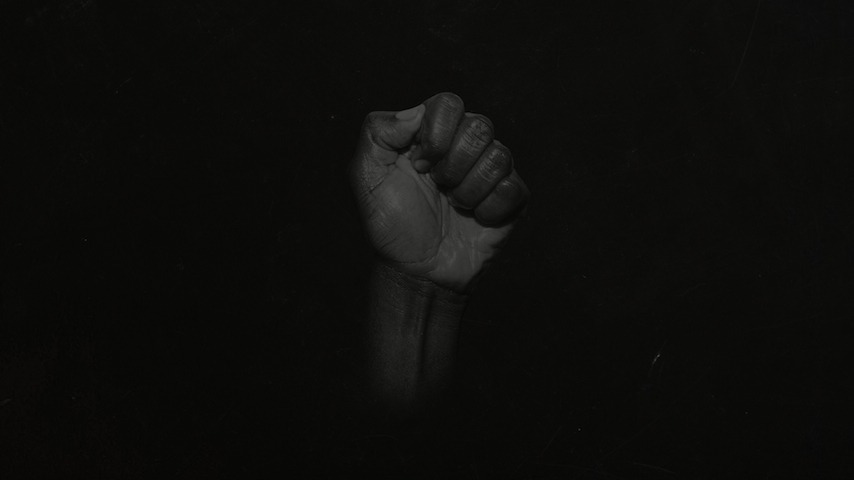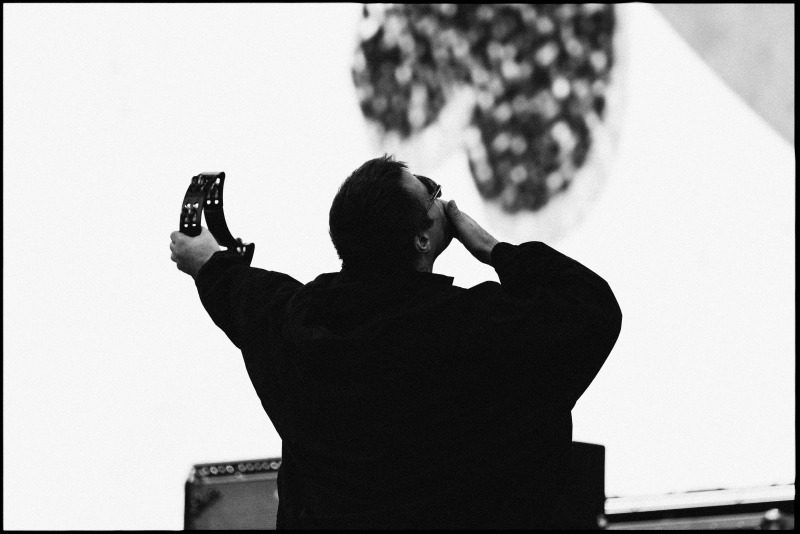If you’re still keeping track of what month it is (we’re only doing it because we have to), give yourself a pat on the back. And if you’re still checking out new music from this year, give yourself another. This past month saw new albums from indie giants like Sufjan Stevens and Fleet Foxes, plus stunning LPs from Sault, Anjimile, Ziemba and more. Scroll down for 10 of our favorite albums from September.
10. Doves: The Universal Want
When post-Britpop stalwarts Doves released greatest-hits collection The Places Between: The Best Of Doves and announced their indefinite hiatus in 2010, frontman Jimi Goodwin told the Daily Record, “This is wiping the slate clean, we have nothing else in the vaults now. That is it. Whatever we do from now on will be a new start.” The band stepped off what he called “that whole album-tour-album-tour treadmill” and onto new creative paths, with Goodwin striking up a solo career, and twin brothers Andy and Jez Williams releasing an album as Black Rivers. Eventually, though, all roads led back to Doves: The trio, freed from the expectations with which they were saddled after multiple Mercury Music Prize nominations and U.K. chart-topping albums, reunited in secret for their first post-Kingdom of Rust writing session in 2017, and now they’ve returned with The Universal Want, a new start that would also make for a fitting ending. The album, one of Doves’ most confident and well-rounded releases to date, finds the trio older, wiser and bursting with a newfound vitality. These songs ponder the passage of time and the impermanence of everything—our endless desire to chase what we’ll never catch—from the peaceful remove of a band with nothing to prove. —Scott Russell
9. Sylvan Esso: Free Love
Electronic duo and festival favorites Sylvan Esso released their highly anticipated third LP last month, and it feels like the perfect time to receive their buoyant, joyful, dance-inducing music. “It’s a record about being increasingly terrified of the world around you and looking inward to remember all the times when loving other people seemed so easy, so that you can find your way back to that place,” the pair said in a statement. Sylvan Esso is made up of Amelia Meath (who you also may know from her folk project Mountain Man) and producer Nick Sanborn. Their music has become increasingly polished over the years, first catching fire with more ambient songs like “Hey Mami” and “Coffee” on their 2014 self-titled debut and following it with 2017’s more pop-forward What Now. Free Love seems to position them somewhere in between those two sounds. Single “Ferris Wheel” is tremendously fun, but it’s also weirdly cleansing. Meath describes this phenomenon best: “Nick wants things to sound unsettling, but I want you to take your shirt off and dance.” There you have it. —Ellen Johnson
8. Sufjan Stevens: The Ascension
“I shouldn’t have looked for revelation,” Sufjan Stevens sings on “The Ascension.” “I should have resigned myself to this.” For 20 years, Stevens’s songs—their genres ranging from bare-bones indie to pop electronica—have reckoned with religion. On his latest album, The Ascension, global issues, rather, come to the forefront. Suddenly, looking to the heavens seems less essential; if you ignore pressing, earthly issues, you’re complicit. A sonic sibling to 2010’s electro-pop Age of Adz and a direct follow-up to 2015’s autobiographical, folk-orchestral Carrie and Lowell, The Ascension looks outward. Mired in anxiety, The Ascension’s existential questions are numerous (“What’s the point of [love] when everything’s dispossessed?,” “Is it all for something? Is it all part of a plan?,” or simply the refrain, “What now?”). While these questions are concerned with death, rebirth and determinism, they also apply to global concerns and American civilization—topics Stevens has never before tackled in such depth. —Caitlin Wolper
7. Róisín Murphy: Róisín Machine
Irish pop singer Róisín Murphy first made a name for herself as one half of ’90s U.K. trip-hop duo Moloko. After the group disbanded in 2004, Murphy embarked on a solo dance-pop career that saw her release four riveting albums, then vault back into the limelight in 2018 as the vocalist on DJ Koze’s immaculate “Illumination.” She’s now revving up her fifth LP, Róisín Machine, which sees Murphy unfurling into a full blown disco diva with a collection of tracks she’s banked across the last decade. Róisín Machine is a collaboration with producer Crooked Man (aka Sheffield’s DJ Parrot), and tracks like “Murphy’s Law” and “Narcissus” are disco-pop at its absolute finest—this is seriously like Robyn meets Sylvester. Murphy needs to be considered among Irish pop’s most accomplished artists, and “Incapable” alone is one of the best dance floor tracks you’ll hear all year. —Adrian Spinelli
6. Rituals of Mine: Hype Nostalgia
In the last five years, Terra Lopez lost her father to suicide and her best friend to a freak boating accident. Already living with depression, it sent Lopez into a harrowing tailspin, and she needed to create in order to heal. Hype Nostalgia is Lopez’s debut LP as Rituals of Mine (you might remember her excellent Sister Crayon moniker), and the music is nothing short of gripping electro-R&B from a queer perspective. On “Exceptions,” Lopez asks, “Am I the only one who’s had enough?” with a fluctuating vocal effect that makes us feel her pain and start to come to terms with our own as well. “Trauma” is an electro-punk number that calls to mind the musings of fellow Sacramento band Death Grips, but with a more even-keeled and palatable delivery. And on “Come Around Me,” she grapples with the lacking authenticity of people around her through a sparse yet menacing beat surrounding her celestial coo. With Rituals of Mine, Lopez presents a necessary voice when we’re all navigating the waves of depression like never before. —Adrian Spinelli
5. Sad13: Haunted Painting
Sadie Dupuis has had a hand in almost every creative aspect of the music industry—between playing in her indie rock band Speedy Ortiz, collaborating with Lizzo, running Wax Nine Records and combining music with advocacy, she’s done it all. Now, Dupuis is back with her first solo album since 2016’s Slugger under the moniker Sad13. The writing process for Dupuis’ new album Haunted Painting started after she witnessed an apparition at a Seattle art gallery, but she dives into ideas larger than her own haunting experiences. “What was it like to come of age in such a cruel place?” Dupuis sings on “The Crow.” The album leans on a loose horror theme, between the vampiric video for early single “Oops….!” and Dupuis presenting as a self-proclaimed “frontdemon.” Despite the concept, lyrics like those on “The Crow” feel aware of their place at this moment amid a tense political climate and months spent in pandemic isolation. —Lexi Lane
4. Anjimile: Giver Talker
On his opulent debut album Giver Taker, Anjimile’s most powerful and enchanting instrument is his voice. The project—which serves as a testament to the different stages of healing—is a sparse nine-track undertaking that reveals just how resilient our protagonist truly is. Anjimile’s story is an uncommon one, but an uplifting one nonetheless: A trans person—in the midst of battling his own demons—excavates the most troubling parts of his past and ultimately seeks out catharsis. Giver Taker is captivating in its detailed storytelling, luscious harmonies and admirable vulnerability. Anjimile’s devotion to his craft is both inspiring and harrowing, which we hear in the highs and lows of this consummate project. His trials and tribulations have only fueled his creative vision. Navigating trauma is innately difficult, but on Giver Taker, we hear how it sounds when it’s done with patience, care and humility. Anjimile touts his hard-won strength throughout the record. A debut this scintillating sets the bar quite high for the 27-year-old songwriter, but, as we quickly learned—he is already up for the challenge. —Candace McDuffie
3. Ziemba: True Romantic
Singer/songwriter René Kladzyk released True Romantic, her latest album as Ziemba. Between flowy art pop and the loftiest power ballads imaginable, Kladzyk’s songs are perfect for a wide variety of settings: an experimental theater production, a slow dance at prom, an Olympic opening ceremony or an accompaniment to calming nature webcams. Her powerful, ribbon-like voice truly knows no bounds, and her songs are lovingly crafted. —Lizzie Manno
2. Sault: Untitled (Rise)
Sault, the enigmatic British group that surprise-dropped the riveting, socially-conscious soul album Untitled (Black Is) a few months ago, are back with another new album titled Untitled (Rise). Last year also saw them release two albums, with the first in early summer and the second at the end of summer, and they’ve continued that pattern in 2020. Their 2019 albums, titled 5 and 7, both landed on a number of music outlets’ album-of-the-year lists. The group is a collaboration between Dean Josiah Cover (aka Inflo), Melisa Young (aka Kid Sister) and Cleopatra Nikolic (aka Cleo Sol), and their music spans soul, funk, Afrobeat and R&B. While Untitled (Black Is) was more pointed about the struggles of the Black experience, Untitled (Rise) shows the carefree, independent and celebratory sides of that existence. The rhythms are more central and vigorous, and there’s a relaxing flow to these songs. Though there are still moments of powerful spoken-word speeches and stomps on tracks like “Rise Intently” and “The Beginning & the End.” With this album, Sault have proven their exceptional dynamism, talent and spirit once again as they’ve delivered another essential cultural staple. —Lizzie Manno
1. Fleet Foxes: Shore
There are several elements that make a Fleet Foxes album great. Layered vocals, daring instrumental swells and vibrant, at times anxious, lyrics are all present throughout their catalogue, from the assured folk-pop of their 2008 self-titled debut to the magnificent existential ramblings on 2017’s Crack-Up. These signifiers are all present on their new album Shore, but the effects are much more nuanced. Fleet Foxes remain a quintessential millennial band, and, on Shore—which dropped with only a day’s warning—they’re once again tapping into the millennial psyche, this time with a little more optimism. Upon first listen, Shore lacks the immediacy of Fleet Foxes and 2011’s Helplessness Blues—at least from a sonic standpoint. But frontman Robin Pecknold’s astonishingly thoughtful lyrics quickly bring the listener back up to speed, at times recalling the grandiose scope of Crack-Up’s more cheerful moments, even if the indie-rock stylings are lagging a bit. —Ellen Johnson




